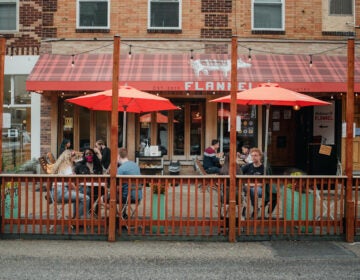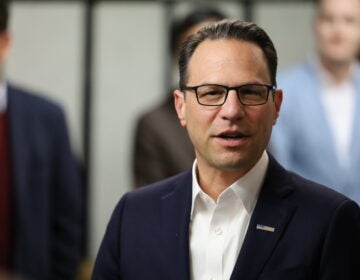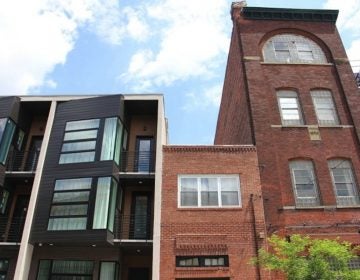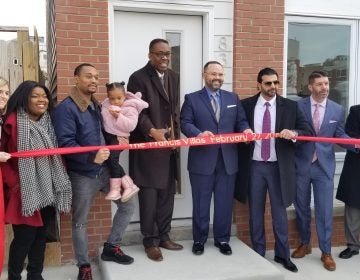Why Philly’s 10-year tax abatement is back on the negotiating table
Philadelphia’s City Council wants to fund a $400 million anti-poverty program with a construction tax — and an old-fashioned horse-trade.

City Council President Darrell Clarke announced the Neighborhood Preservation Initiative in Philadelphia’s South Kensington neighborhood on Oct. 15, 2020. (Kimberly Paynter/WHYY)
Philadelphia’s City Council wants to fund a $400 million anti-poverty program with a construction tax — and an old-fashioned horse-trade.
It’s a little bit of what’s old is new again with a plan to revive a formerly politically unpalatable 1% construction tax proposal while proposing to delay planned reductions to the city’s 10-year tax abatement until 2024.
The construction tax introduced in a bill Thursday would enable council to fund affordable housing, eviction prevention programs and investments in neighborhood commercial corridors. A second bill introduced by Councilmember Bobby Henon would delay abatement changes slated for January, keeping the valuable development subsidy intact and appeasing the real estate industry that has fought the planned reduction for years.
The construction industry bitterly also opposed the impact fee in 2018 when it passed out of council in a 9-8 vote. But the legislative body lacked support from Mayor Jim Kenney and eventually dropped the proposal.
The climate is different now that the city is struggling to survive the coronavirus pandemic and resulting economic crisis. City Council and the mood of many voters have shifted left. Meanwhile, people continue to buy homes in the city and developers continue to build them. Even with the abatement untouched until 2024, council staff estimate the construction tax would bring in at least $20 million in revenue a year.
“Every now and then, the stars align,” said City Council President Darrell Clarke at a press conference Thursday. “So those same people who beat us back a little bit [on the tax] and expressed some concerns, they kind of need something from us right now.”
Clarke sees the moment as ripe for an agreement that will help the city get a new revenue source for needed public programs while assisting the building industry with a profitable incentive. Developers agree.
“The key is to link [the abatement and tax] together,” said developer Carl Dranoff, who fears any change to the abatement that has underwritten his condo and apartments since its creation two decades ago. “You wouldn’t want to have a construction tax as a stand-alone, that would do nothing but discourage projects … 1% of nothing is nothing.”
At a press conference Thursday, Clarke described months of meetings with business and community leaders informed by the inequity highlighted by the pandemic, as well as encampment protests demanding more be done to create affordable housing.
“There is no time to wait,” Clarke said. “Poverty is growing, and these needs are urgent. We need to act now to fund programs that will create a more prosperous future for every Philadelphian, rather than a select few.”
Still, not everyone is on the same page about the best way to achieve that goal. West Philadelphia Councilmember Jamie Gauthier was one of the new members who helped pass the abatement change last year and she opposes any proposal that would delay it.
“Over the years, we’ve seen what the abatement has done to affordability in neighborhoods across Philadelphia – our Black neighborhoods, in particular – and how it has spurred displacement and gentrification,” said Gauthier in a statement.
Gauthier supports the $400 million bond offering to invest in housing and communities, but says the public investment should not depend on continuing a development incentive that many taxpayers don’t benefit from.
More public meetings are planned where people will be able to weigh in on the proposals, Clarke said.
Meanwhile, Councilmember Cherelle Parker urged her colleagues to act. The $400 million anti-poverty package would go toward small businesses and communities desperately in need after a pandemic that has torn a gaping hole in the city’s economic fabric.
“We can’t sit by idly during this time and wait for someone to come to our rescue,” Parker said.

Subscribe to PlanPhilly
WHYY is your source for fact-based, in-depth journalism and information. As a nonprofit organization, we rely on financial support from readers like you. Please give today.








